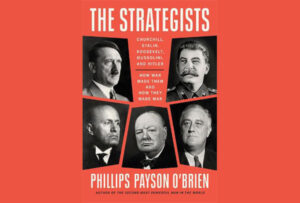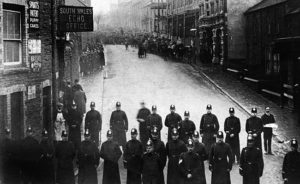Finest Hour 181
“My Dear Major Roosevelt”
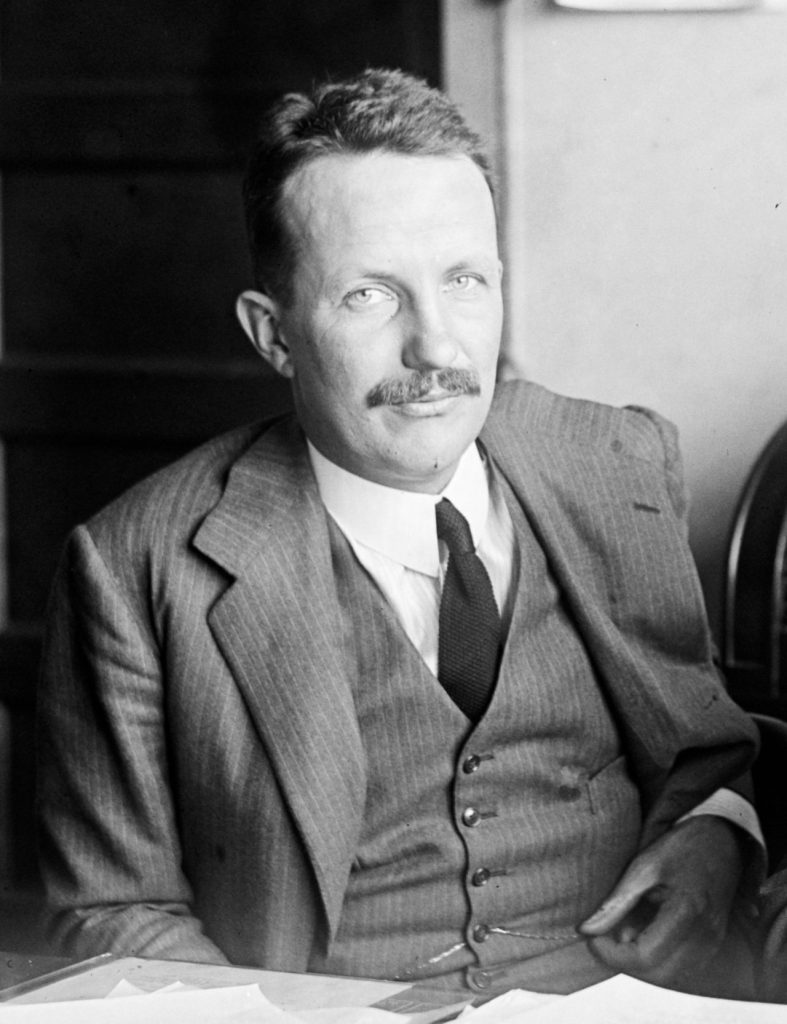
Kermit Roosevelt in 1926
December 20, 2018
Finest Hour 181, Summer 2018
Page 22
By Fred Glueckstein
In 1915, Kermit Roosevelt, the son of President Theodore Roosevelt, was appointed an honorary captain in the British Army. Roosevelt served under General Allenby in Palestine, saw active service in Mesopotamia with the Royal Field Artillery, and was awarded the Military Cross. In 1916, Roosevelt transferred to the US Army’s First Division and commanded an artillery battery from 1917 to 1918. When the Second World War began, Roosevelt once again sought to serve in the British military.
Fred Glueckstein is author of Churchill and Colonist II (2015) and a regular contributor to Finest Hour
When Kermit Roosevelt first arrived in London in the fall of 1939, it was believed that he would accept a position in the ministry of shipping, since he had been vice president until 1938 of the United States Lines and a friend of Winston Churchill, the First Lord of the Admiralty. Like his celebrated father, however, Roosevelt, expressed a preference for action. In October, Roosevelt saw Churchill at the Admiralty and asked for his assistance in obtaining a regular commission in the British Army. With Churchill’s help, Roosevelt was commissioned as a major in the Middlesex Regiment, where he trained as a machine gun expert.
Roosevelt’s British commission soon raised questions about his American citizenship. Under the headline “Kermit Roosevelt in British Army,” The Christian Science Monitor reported from Washington on 3 November: “An official said Nov. 3 Kermit Roosevelt would not lose his American citizenship by serving in the British Army. American citizenship is lost, he said, not when an American simply serves in a foreign army, but when the American, on enlisting, takes an oath of allegiance to the foreign ruler. It is presumed that in this case Mr. Roosevelt has enlisted without taking any oath of allegiance.”1
On 22 November, the Washington Post reported “Kermit Roosevelt, Now British Major, Gives up Citizenship.” The story read, “Kermit Roosevelt, 50-year-old son of President Theodore Roosevelt, who has recently joined the British army as a major, has renounced his American citizenship and has become a British subject, it was established today. Although Maj. Roosevelt, when interviewed this morning, would not confirm or deny the two-month-old rumor, a British official pointed out that it would be impossible to join the army as a citizen of a foreign state.”2
With the British Army
In early March 1940, Roosevelt was named a colonel in order to lead the British contingent in the international expeditionary force to aid Finland. On 5 March, Roosevelt had lunch with Churchill and then went to the recruiting office of the International Brigade. “Uniformed in khaki, with silver buttons of the International Brigade, Colonel Roosevelt shook hands with Czechs, Austrians, Poles, Swedes, Irishmen, and soldiers of fortune from the two Americas. Officials of the Finnish Aid Fund said about a dozen Americans were among the 5,000 men who had volunteered,” reported The New York Times.3
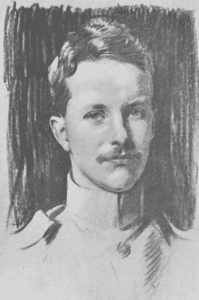
On 8 March, Roosevelt, in the company of American Ambassador to the UK Joseph P. Kennedy, met at 10 Downing Street for lunch with Prime Minister Neville Chamberlain. Before the mission was launched, however, Finland was overrun and forced to surrender.
Two months later, Roosevelt was with the British Expeditionary Force in a raid into Norway and took part in the Battle of Narvik, which was fought in the mountains surrounding the city of Narvik. The fighting involved Norwegian, French, British, and Polish troops against German mountain troops, shipwrecked Kriegsmarine sailors, and paratroopers from the 7th Air Division.
With fewer troops and weaponry, the raid was a disaster, and the British had to retreat. “Although 50 years old and out of shape, Kermit was valiant during the evacuation, helping get men and equipment out and even carrying some of the wounded on his back,” wrote Edward J. Renehan Jr., a Roosevelt biographer.4
Ill Health
After Norway, Roosevelt was sent to Egypt. With no military action there yet taking place, he found himself only on routine patrols and drills. Facing tedium, Roosevelt starting drinking again, which he had stopped when entering the army. Soon the reappearance of malaria, acquired while working in South America, complicated the problem of an enlarged liver. Roosevelt’s medical condition led to his discharge from the British Army in early 1941.
Wanting desperately to remain in the army, Roosevelt was determined to fight the decision. Undoubtedly, Roosevelt’s family tradition of rendering distinguished service, particularly in view of his father’s historic military exploits, would have been on his mind. For Kermit Roosevelt fighting for England against the Germans would have been a matter of family honor and pride. Accordingly, he went to see Churchill, who was now Prime Minister, to ask for his support.
After meeting with Roosevelt, Churchill reached out to David Margesson, the Secretary of State for War, on Kermit’s behalf in the following letter dated 13 February 1941 and marked with one of the Prime Minister’s famous “Action This Day” labels:
Major Kermit Roosevelt has been to me in great distress, because although his own doctors and his Regimental doctor have said he was quite fit, the Millbank [Queen Alexandra’s Military Hospital] doctors have marked him ‘E’ this morning, thus putting him out of the Army. When he came originally to me at the Admiralty in October 1939, I considered it a matter of political consequence that his wish to serve with us in the fight should be granted. I thought it symbolic. I still think that he should not be treated as an ordinary case, and if he wishes to go on with us he should be allowed to do so.
Will you very kindly look into the matter? His morale is very high. And he is very unhappy at the idea of being invalided out now.5
Margesson informed Churchill that the Millbank medical decision to release Roosevelt from the Army would be maintained. Accordingly, Churchill informed Roosevelt of the result of his effort to have him reinstated. Refusing to accept the decision, Roosevelt proposed an alternative to Churchill, who replied on 25 March 1941:
My dear Major Roosevelt
In the letter which you wrote to me after I regretfully told you that there could be no chance of your remaining on the active list you asked me whether you might be accepted for service in a minesweeper. While I have nothing but admiration for your anxiety to serve in any capacity that may be open to you, I am sorry that the medical reports on your case make it impossible for me to recommend you for anything of this kind.
I hate to disappoint you…but there is no alternative open to me.6
On 5 May 1941, Roosevelt resigned his commission as major in the British Army due to ill health.
Return Home
On 6 May, Roosevelt arrived at La Guardia Field from Halifax by way of Boston, where he had been met and accompanied to New York by his wife Belle Willard Roosevelt. After almost two years of War Duty, Roosevelt was once again home. When the United States entered the war on 7 December 1941, however, Roosevelt joined the American military.
With Roosevelt’s drinking growing worse and his behavior becoming erratic, his family believed that if he were given a duty assignment of importance, he would remain sober and meet his responsibilities. At the request of Belle and brother Archie, Kermit’s cousin President Franklin Roosevelt and Army Chief of Staff George C. Marshall arranged for him to receive a commission.
Kermit was eventually assigned to the army airbase at Fort Richardson in Alaska. His duties were ambiguous. With no specific mission, Roosevelt convinced army pilots to allow him to accompany them as an observer on missions to bomb Japanese positions in the Aleutians. When his liver acted up in early 1943, Roosevelt was flown to Vancouver and hospitalized. In May, while on medical leave in the US and his behavior again erratic, he was ordered back to Fort Richardson.
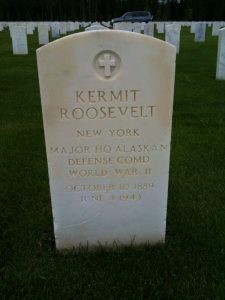
On 4 June 1943, Kermit Roosevelt was found dead in his room. The news was reported in the United States and England. The Associated Press story on 6 June read: “The War Department, in announcing his death, said yesterday that officers had given no details. Since the Alaskan commander reported simply that he died yesterday, it was presumed here that death was not due to enemy action. Ordinarily, the phrase ‘killed in action’ is used in reporting a death in combat.”7 At the time of Roosevelt’s death it was reported to his mother Edith that the cause of death was a heart attack.7
Due to the sensitive nature of his family position, it was only many years later that the actual reason for his death become known. Kermit Roosevelt died from a self-inflicted gunshot wound. He was interred in the Fort Richardson Cemetery.
Requiem for a Roosevelt
In England, Churchill learned of Kermit Roosevelt’s death. He certainly would have remembered Roosevelt’s service in the British Army, and his fervent desire to continue after official doctors deemed him medically unfit. Churchill would most likely have also remembered the last letter he wrote to Roosevelt informing him that there was no chance for him to remain in the Armed Forces. Aware of Roosevelt’s determination to serve, Churchill would have recognized his disappointment.
Although Churchill’s efforts on Roosevelt’s behalf were unsuccessful, he would have admired the American’s courage and gallantry by serving not once but twice in defense of Britain. Churchill would have assumed that Kermit’s father President Theodore Roosevelt, who died many years earlier, would have been proud of his son.
Endnotes
1.“Kermit Roosevelt in British Army,” The Christian Science Monitor, 3 November 1939, p. 6.
2. “Kermit Roosevelt, Now British Major, Gives up Citizenship,” The Washington Post, 22 November 1939, p. 18.
3. “Kermit Roosevelt Greets Brigade: Sees Force He Will Command in Finland,” The New York Times, 6 March 1940, p. 8.
4. Edward J. Renehan Jr., The Lion’s Pride: Theodore Roosevelt and His Family in Peace and War (New York: Oxford University Press, 1998), pp. 229–30.
5. Martin Gilbert, ed., The Churchill Documents, Volume XVI, The Ever-Widening War 1941 (Hillsdale, MI: Hillsdale College Press, 2011), pp. 214–15.
6. Ibid., p. 395.
7. “Maj. Kermit Roosevelt Dies in Alaska; Son of Late President,” The Washington Post, 6 June 1943, p. M1.
Subscribe
WANT MORE?
Get the Churchill Bulletin delivered to your inbox once a month.


